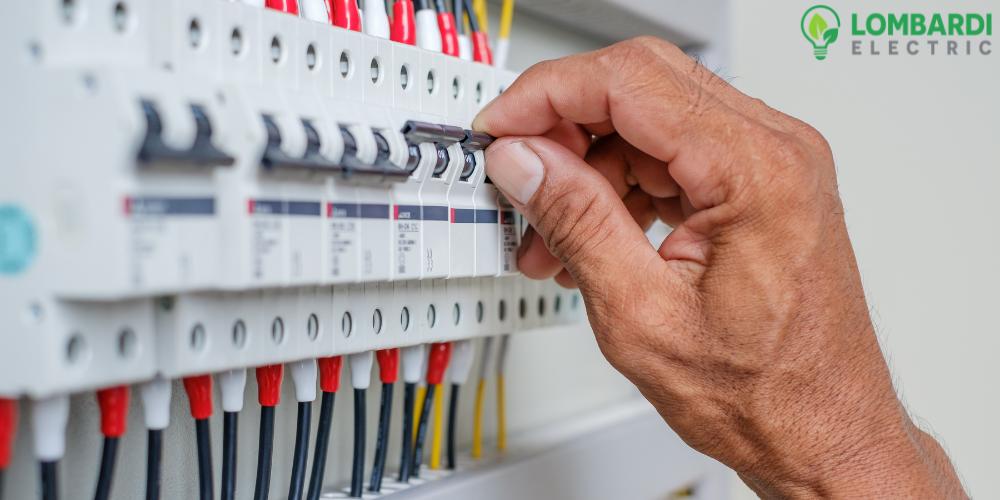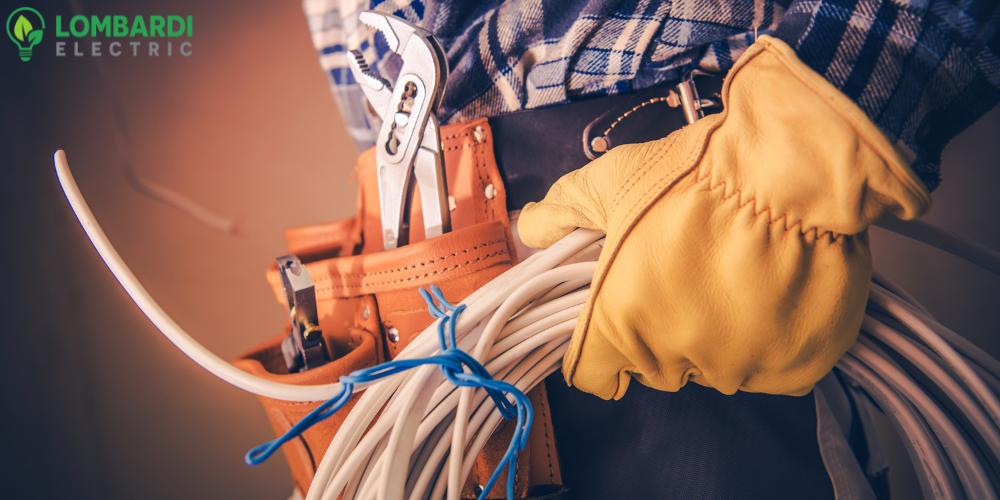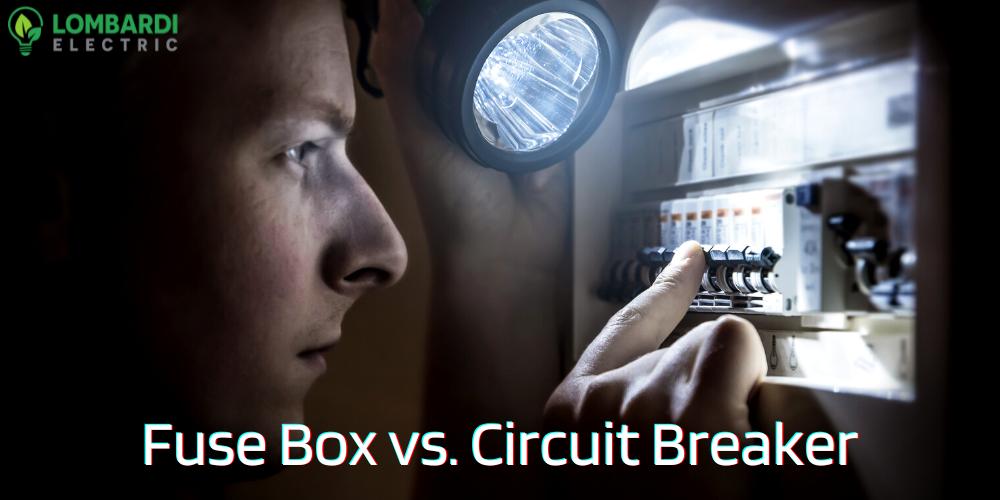Maybe you’re a new homeowner, and you’re trying to learn the basics about the electrical equipment and electrical components that not only keep your lights on, but keep you safe from fire hazards as well. You have come to the right place. Terms like fuse box and circuit breakers are sometimes used interchangeably, but there are key differences between them. Below, Alexandria electricians at Lombardi Electric break down everything you need to know about a fuse box vs. circuit breaker.
Lombardi Electric is a commercial, residential, and industrial electrical service company based in Alexandria, Louisiana. We are a team of skilled electricians committed to delivering high-quality results and customer service, day and night. Call 318-545-7575 to speak with one of our experienced electricians today.
What is a Fuse Box?
A fuse box, also known as a fuse panel, is a metal box that generally houses 6 to 12 fuses. Fuse boxes can have either cartridges – which protect 240V circuits from overloading – or plugs – which can protect 120V circuits from overloading. The central fuse box is basically the home’s electrical system. It separates incoming voltage into different circuits.
How a Fuse Box Works
Fuses are made up of thin wires that are encased in either ceramic or glass, and finally wrapped with a metal casing. They are inserted between two power terminals – on the positive side of a power supply. When a fuse functions normally, the electricity flows through the thin metal wire between the circuits.
A fuse is considered an Overcurrent Protective Device (OCPD) that breaks a circuit when there’s excessive power supply. When a fuse wire melts, it interrupts the electrical current, and prevents an electric fire or extensive damage to the wiring in your house. This is what’s called a “blown fuse.” When a fuse blows, it can’t be fixed and used again. Instead, it has to be replaced with one of the same amperage rating.
If you’re learning how to fix and overloaded circuit or you’re trying to replace a blown fuse by yourself, do not replace it with a fuse of a higher amperage rating than the manufacturer intended for the circuit. If you do this, too much power can be applied and lead to overheated wires, which can lead to dangerous electrical fires in the home.
Fuse Box Pros
- Fuse boxes are often cheaper than circuit breakers, making them popular in solar panel inverters and cars especially.
- Fuse boxes and the fuses inside can be a space saver compared to an electrical panel and/or circuit breaker.
- When a fuse wire melts or “blows,” this is a good thing in that the fuse has done what it’s supposed to do.
- Internal fuses can be a great line of defense for an electrical overload in home appliances like dryers, refrigerators, and ovens.
- Fuse boxes generally don’t require much maintenance.
- Fuses can trip faster than circuit breakers.
- When a fuse blows, you’re immediately aware of whatever electrical problem is happening in your house.

Fuse Box Cons
- Blown fuses need to be immediately replaced, and this can be quite the inconvenience if you’re in the middle of some kind of emergency or your local hardware store doesn’t have the right fuse available.
- Fuse boxes do not have magnetic or ground fault protection.
- Inrush currents often require larger wires in the fuse box.
- Resetting a breaker is usually easier than completely replacing a blown fuse.
- Fuse boxes can be dangerous, especially to those who don’t have basic electrical knowledge. That’s because fuses have live parts that are uncovered which can lead to electrocutions and/or electric shocks.
- Fuses do not protect against short circuits, only electrical overloads.
What is a Circuit Breaker?
A circuit breaker is also considered an Overcurrent Protective Device (OCPD), and it basically does the same thing as a fuse; it provides protection from power overloads. Circuit breakers are contained inside electrical panels. Breaker panels allow electricity to flow from the home and divide it into different electrical circuits.
The circuit breaker functions properly with the following parts and mechanisms:
- Tripping mechanism
- Operating mechanism
- Molded frame
- Arc chutes
- Contacts
There are many different types of circuit breakers that homeowners can choose from nowadays. You can choose a single pole or double pole breaker, one that protects against ground faults, one that protects against arc faults, among many others.
How a Circuit Breaker Works
In order to stop electricity from flowing into a circuit in a standard breaker box, one must bend the biometric strip or flip the integrated magnet. This will cause the two integrated contacts (one unmoving and one moving) to disengage.
If the power load exceeds supply, a circuit will “trip” or break because it became overheated. This means it will automatically switch to the off position during a power surge. A circuit trips to prevent further overheating, which again can lead to house fires. Short circuits can also cause breakers to trip. A short circuit occurs when electricity flows through a shorter pathway of less resistance.
All you have to do to fix a tripped or overloaded circuit is open the breaker panel and reset the internal switch mechanism. This will typically restore power to a home and protect electronic devices within a home. But you also have to determine what caused the short and/or overloaded electrical circuits, or you’ll keep having problems.
Circuit Breaker Pros
- Circuit breakers can be reset and used over and over again; they do not need to be replaced every time they trip.
- Circuit breakers can handle a current or power surge multiple times as long as it hasn’t suffered major damage.
- A circuit breaker box has a much longer lifespan than a fuse box.
- You can test to make sure a circuit breaker functions properly. On the other hand, you usually don’t know that a fuse is functioning properly until it blows.
- Depending on the size of the circuit breaker, it can protect individual devices or it can protect multiple devices in a household.

Circuit Breaker Cons
- Not every circuit breaker has trip indicators that will tell you immediately that a breaker has tripped.
- Some types of circuit breakers need regular maintenance, such as molded circuit breakers.
- If a circuit breaker keeps tripping on a regular basis, it can wear out quickly and require replacement.
- Circuit breakers are often more expensive than fuse boxes.
Fuse Box vs. Circuit Breaker: What’s the Difference?
By now, you should know that a fuse and circuit breaker do the same thing: protect a home or electrical devices from an electrical overload.
But – circuit breaker vs. fuse box – what’s the main difference between the two?
Fuse boxes are smaller than circuit breaker panels, and only hold about a dozen fuses. Meanwhile, electrical panels contain circuit breakers. Circuit breakers are basically a collection of electrical switches that you can move from the “on” to “off” position, or vice versa. Fuse boxes typically have rows of knobs. When a fuse blows, you have to replace it, so fuses can have a short lifespan because they are not reusable. On the other hand, tripped circuits can be reused over and over again unless they’re clearly damaged. Finally, circuit breakers can provide better protection to a household or connected devices, because not only do they protect against overloads, but they protect against short circuits too.

Call Lombardi Electric Today
If your home or business is experiencing frequent electrical problems, it’s time to call in the professionals at Lombardi Electric. We are a commercial, residential, and industrial electrical service company based in Alexandria, Louisiana that’s open 24 hours a day. We are the best team of electricians to call in the event of an emergency. Call 318-545-7575 to speak with one of our experienced electricians today.

